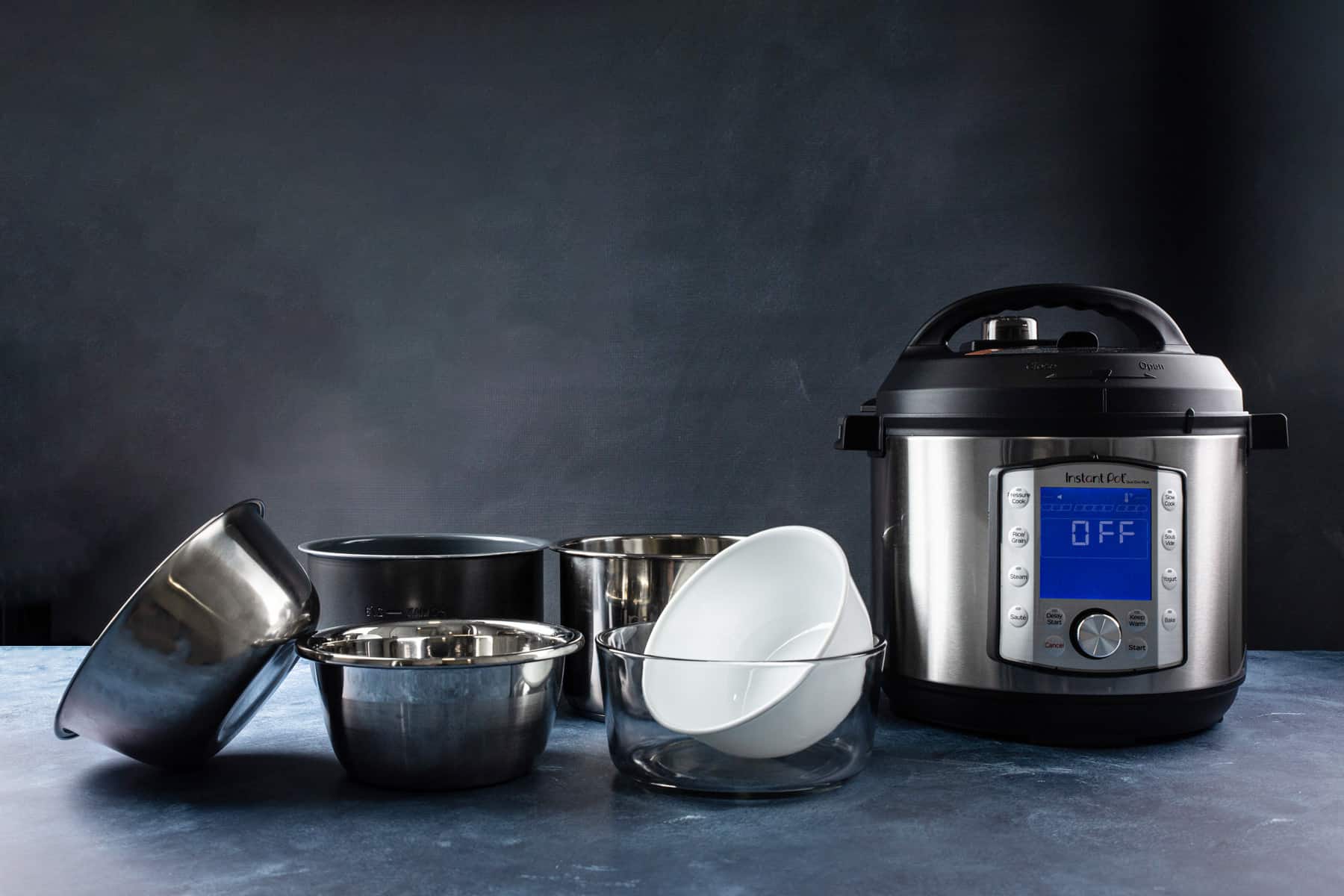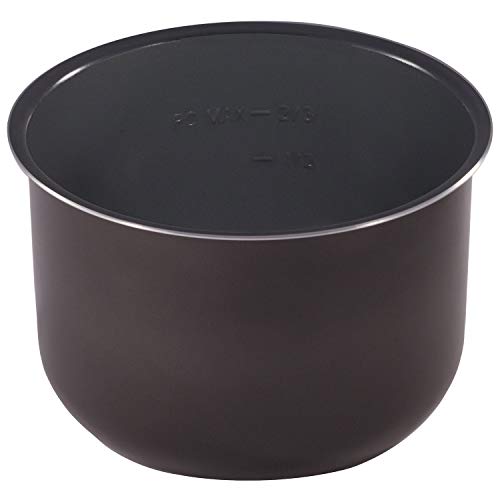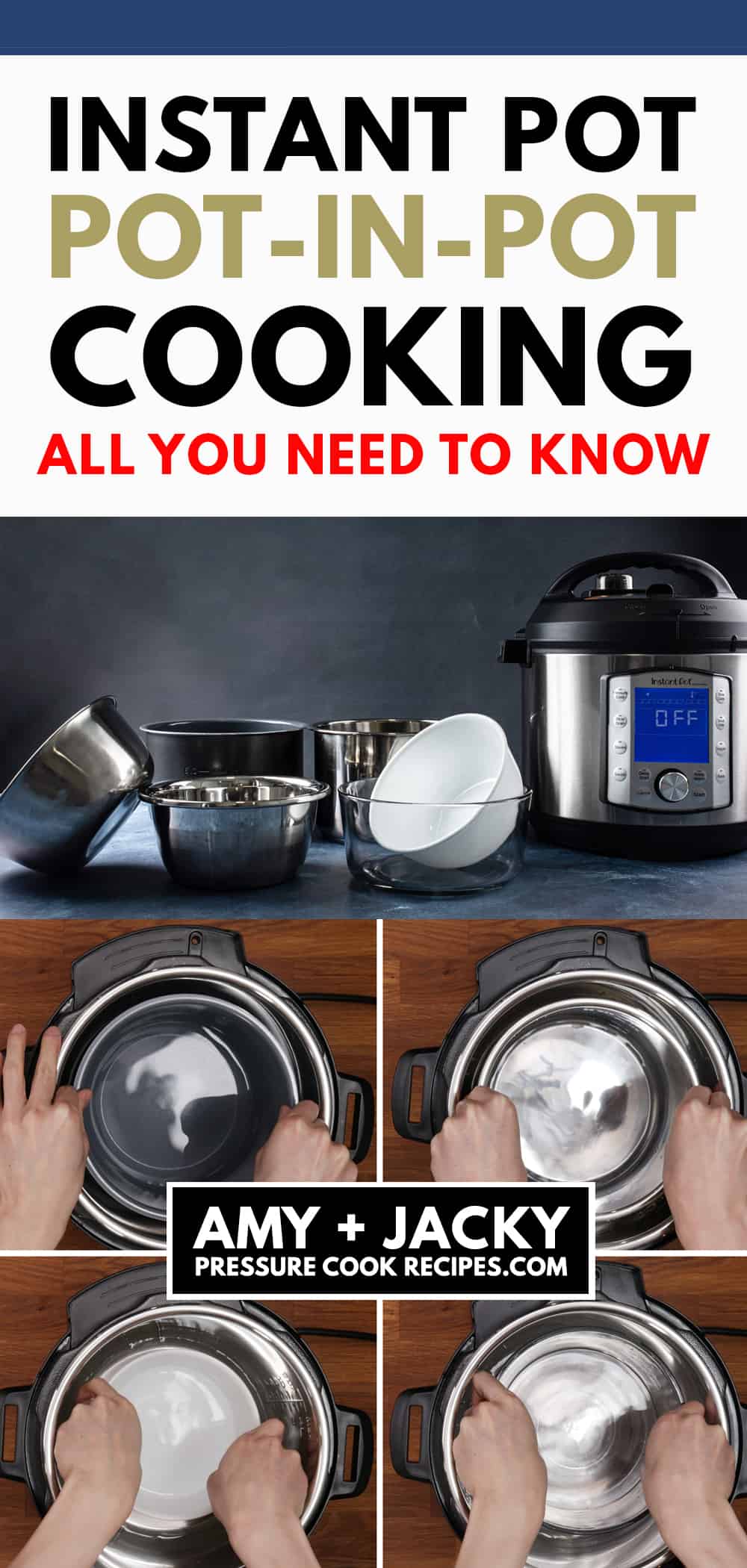Ever wondered what type of container is best for the Pot in Pot Instant Pot Cooking Method? After conducting over 28+ tests in the past 3 months, we’re excited to share our experiment results! 🙂
Pot in Pot Instant Pot Cooking Guide
- What does Pot in Pot mean?
- What is Pot in Pot?
- When to Use Pot in Pot?
- Accessories for Pot in Pot
- What Containers can I use for Pot in Pot?
- Pot in Pot Experiment
- Conclusions & Recommendations
*Note: Many pot in pot containers we recommended in the past often run out of stock quite fast. So, with our 28+ experiments, we’ve focused on testing the widely available containers.
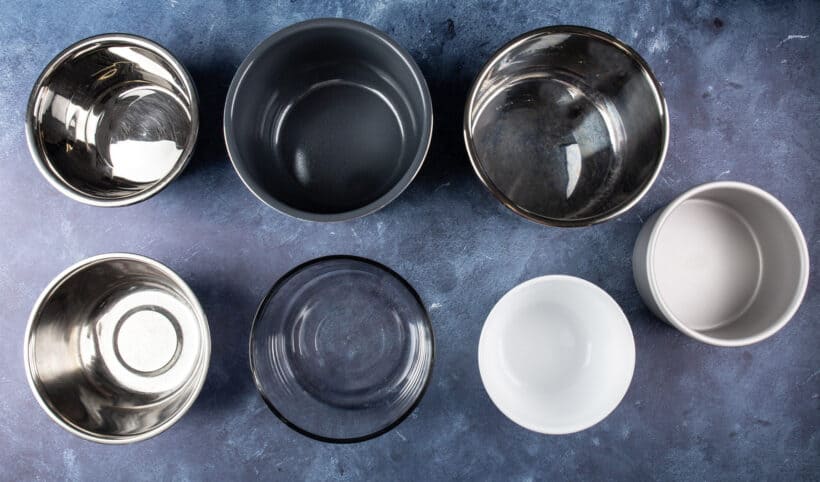
What does Pot in Pot mean for Instant Pot?
“Pot in Pot (PIP) for Instant Pot” is a type of cooking method. With this technique, you can cook with a smaller pot inside the Instant Pot’s inner pot (liner). Hence the name “a pot inside the pot”.
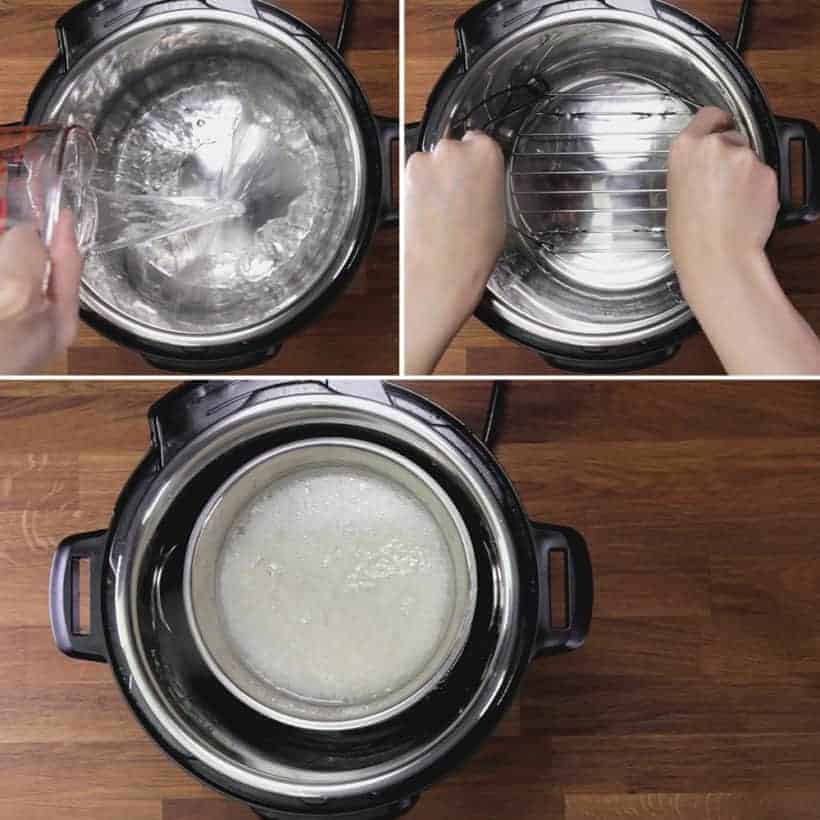
What is Pot in Pot for Instant Pot?
The PIP method allows you to cook food in a smaller pot inside the Instant Pot’s inner pot (liner).
It’s a very useful and helpful technique for a variety of practical applications. It saves time, makes it more convenient to cook or clean, and offers more possibilities on what you can cook.
When to Use Pot in Pot Instant Pot Cooking Method?
1. Cook Multiple Dishes in the Same Pot at the Same Time
One of the best reasons to use the PIP technique is you can cook more than one dish in one Instant Pot at the same time.
Instead of cooking all the ingredients directly in Instant Pot‘s inner pot, you can stack separate layers of food, and cook them all at the same time. A whole new level of “One Pot Meal”.
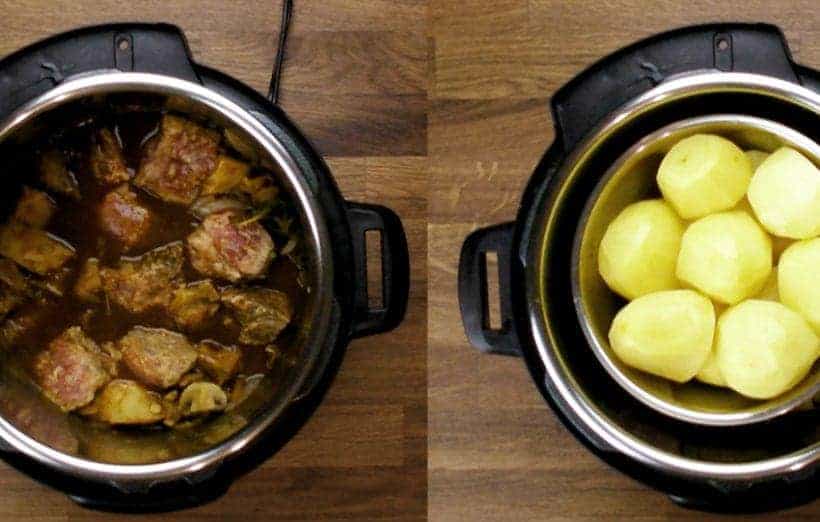
Pot in Pot Recipes that make convenient One-Pot Meals:
2. Pressure Steaming
You need to use liquid to pressure cook in the Instant Pot. With the PIP technique, you can use the steam to cook food instead of cooking the food directly in the liquid.
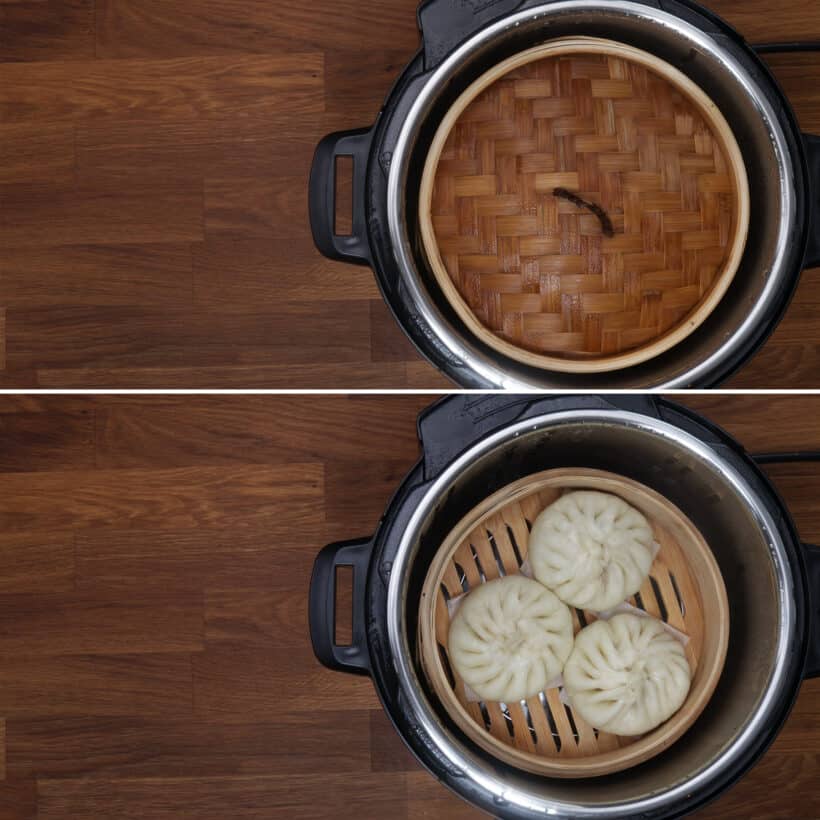
Here are some recipes that use PIP pressure steaming technique:
3. Bain-Marie Recipes
Bain-Marie is a type of cooking method that uses a heated water bath. This method lets you cook food more gently, slowly, with uniform heat, and more moisture. It’s usually used for cooking delicate dishes.
The PIP method can somewhat mimic the bain-marie method by using moist heat cooking. It cooks food in a more gentle way with uniform heat and more moisture.
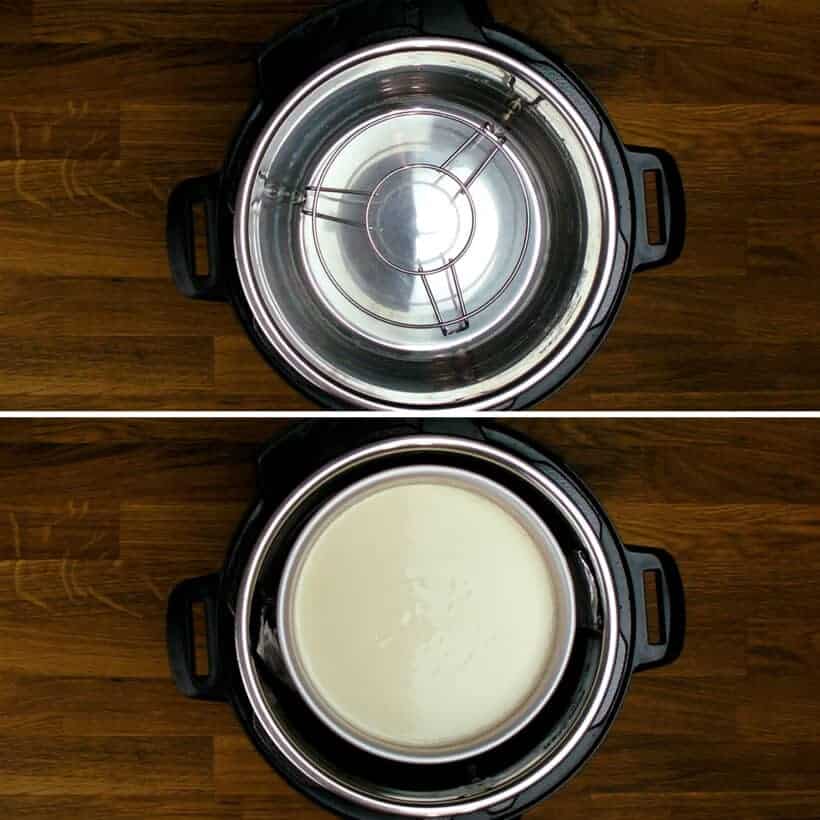
Recipes that traditionally use the bain-marie method, but developed using the Instant Pot:
4. To Avoid Mushy Food
The PIP technique is also great for cooking more delicate or quicker-cooking food. It’ll reduce the amount of heat transfer by lifting the food away from the heat source (the bottom of the inner pot).
Example – Japanese Chicken Curry Recipe: We cooked half of the potatoes in a PIP stainless-steel bowl instead of in the Instant Pot with the chicken. This will preserve the potatoes’ texture & prevent them from going mushy.
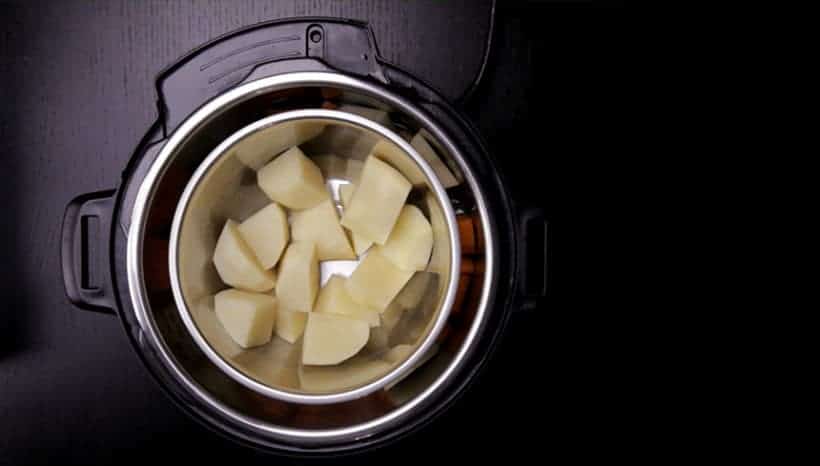
5. Prevent Scorching (Burn Error)
Newer Instant Pots are more prone to trigger the “Burn Message”. This happens when it detects a high temperature (140°C or 284°F) at the bottom of the inner pot. Then, the “burn-protection” mechanism will suspend heating to prevent burning food.
So be careful when you use ingredients that are more prone to triggering the “Burn Error”. Such as milk, thick sauces, tomato-based ingredients, or other dairy products.
You can prevent burn errors by using the PIP technique to cook these ingredients. Just make sure you’re pressure cooking with enough liquid at the bottom of the inner pot and properly sealing the Venting Knob.
You can read more about Instant Pot Burn Message.
Example – Chicken Alfredo Recipe: Instead of mixing the alfredo sauce into the pasta, we cooked it in a separate stainless steel bowl on top of the pasta.
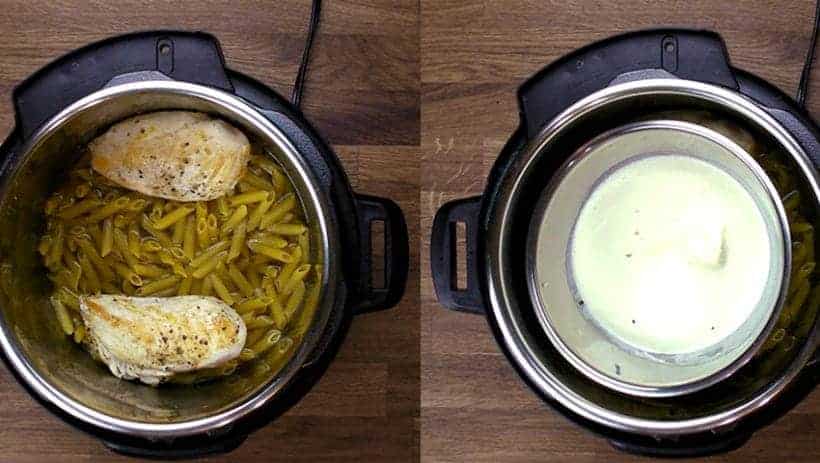
Example – Instant Pot Polenta: To avoid triggering the burn sensor, we cooked the ground polenta in a smaller stainless steel container instead of cooking them directly in the inner pot.
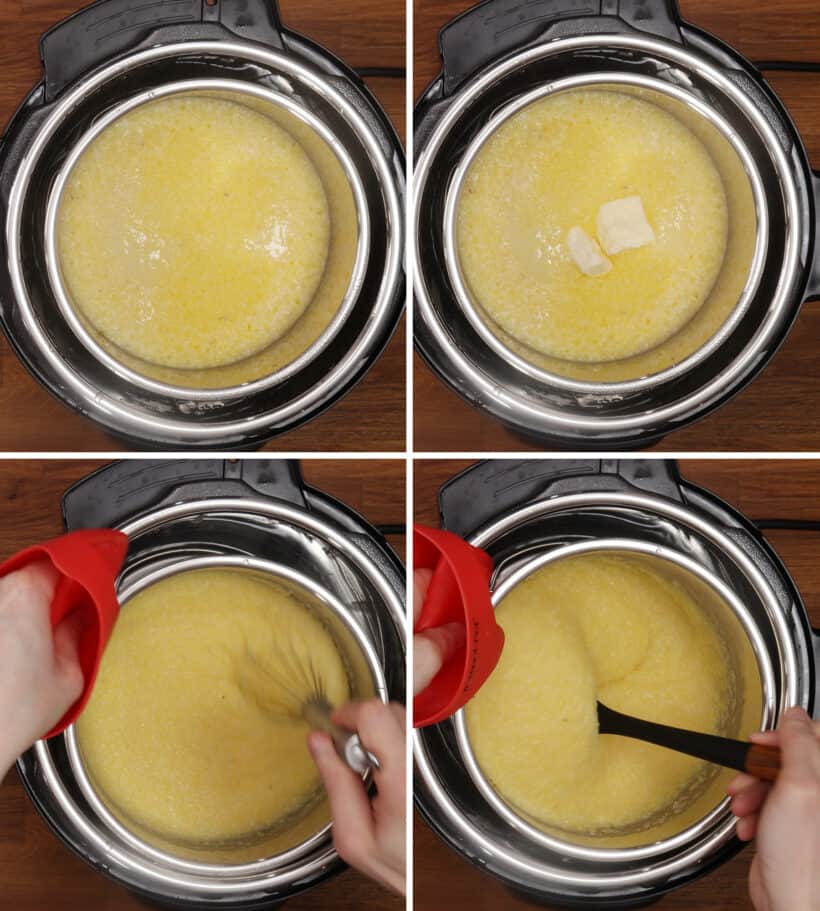
6. Easier Cleaning
There are foods you can cook directly in the Instant Pot’s inner pot. But using the PIP method will make it much easier to clean up.
This is especially helpful when you need to use the Instant Pot to cook several dishes back to back.
It’s another bonus that it’s easier to remove & serve food right from the smaller pot.
For example, we love to use this PIP method when cooking Pot in Pot Rice or Instant Pot Sticky Rice.
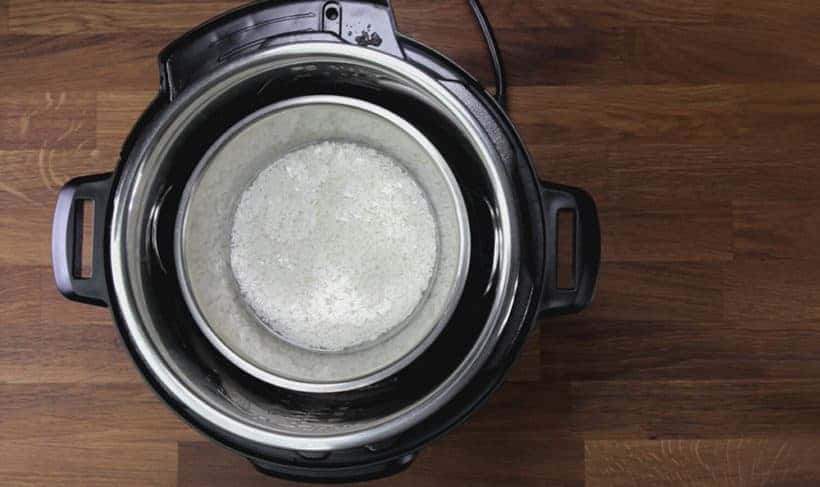
7. Reheat Food (especially dishes with thick liquid)
The pot in pot method is great for reheating food in the Instant Pot. This way, you don’t have to worry about burning, scorching, drying out the food. Plus, you can reheat the food in the container you stored the leftovers, you don’t have to dirty another pot or pan!
Accessories for Pot in Pot Cooking Method
You only need 2 simple accessories to use Pot in Pot in Instant Pot:
- Container, Pot, or Steamer Basket: Generally, make sure your container fits inside your Instant Pot’s inner pot. This is where you’ll put your ingredients inside the Instant Pot.
- Trivet, Steamer Rack, or Sling: Generally, you use this rack to lift your smaller container away from the bottom of the inner pot.
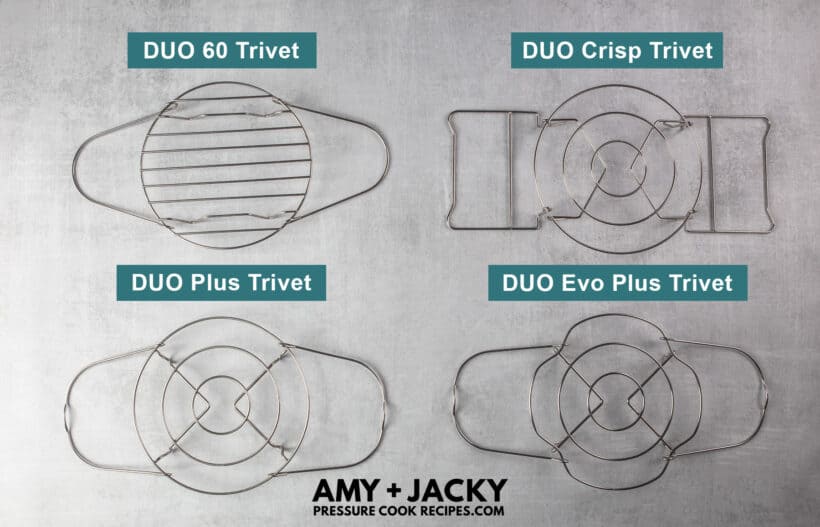
What can I use for pot in pot instant pot?
Many readers often ask us what bowls are safe to use in Instant Pot. And which containers are the best?
There are lots of options on what you can use for the pot in pot method. Including containers made of stainless steel, glass, ceramic, silicone, aluminum, bamboo, or copper.
All pots are not created equal. Different containers transfer heat differently depending on factors like material, size, and thickness. Thus, the specific container you use will affect the optimal cooking time.
That’s why it’s important to adjust the cooking time according to your container. Or else you may end up overcooking or undercooking food.
Can I Use Pyrex in the Instant Pot?
It’s generally safe to use Pyrex in the Instant Pot. But make sure it’s not broken, scratched, chipped, or cracked to avoid the rare case that they shatter.
You must follow all Pyrex’s safety precautions such as avoid sudden temperature changes. Some tips to prevent breaking Pyrex glass:
- Don’t place the hot Pyrex on a wet or cool surface (i.e. countertop, metal surface, in the sink).
- Don’t handle the hot Pyrex with a wet towel or potholder.
- Before washing, refrigerating, or freezing the hot Pyrex, allow it to cool on a cooling rack, dry potholder, or dry cloth.
Pot in Pot Experiment
To find out which container is the best for the pot in pot method, it’s time for another Amy + Jacky Instant Pot Experiment!
We tested the following containers to find out which one is the best for the Instant Pot pot in pot cooking method.
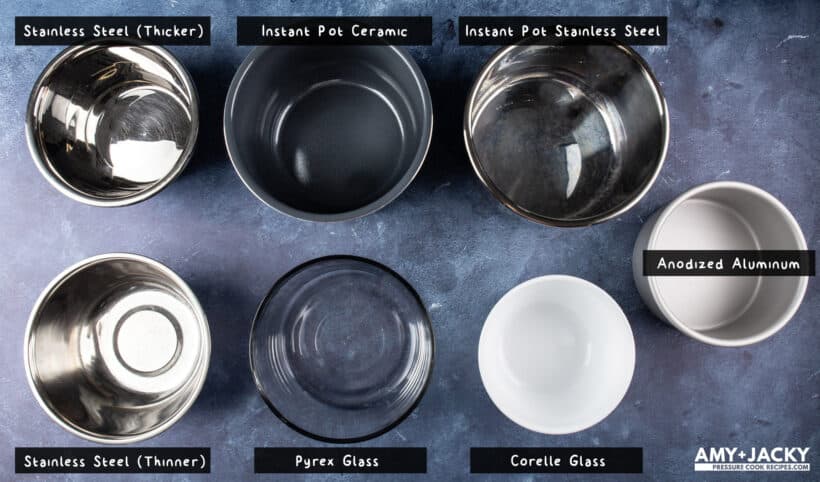
Instant Pot Pot in Pot Containers
- 7-inch Pyrex Glass Container
- 7″ Stainless Steel Container (Thinner)
- 6.5″ Stainless Steel Container (Thicker)
- 3 QT Instant Pot Stainless Steel Inner Pot
- 3 QT Instant Pot Ceramic Inner Pot
- 6-inch Fat Daddio's Anodized Aluminum Cake Pan
A. Pot in Pot Cooking Method on a Trivet
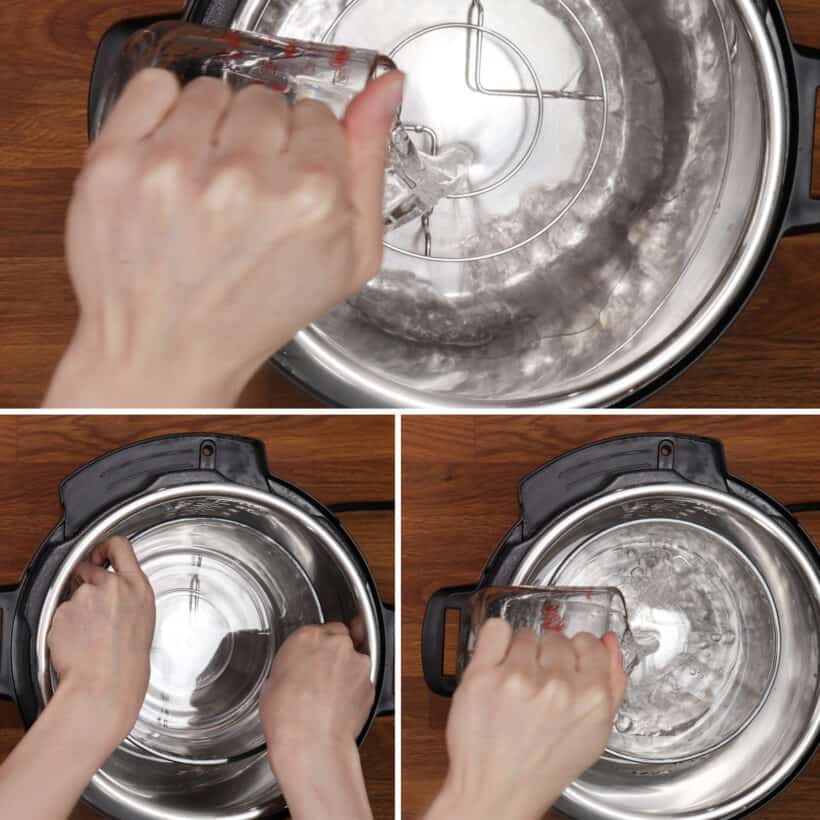
Testing Method: We added a trivet and 1 cup (250ml) of cold water in the Instant Pot. Add in the container and pour 1 cup (250ml) of cold water into the container as well.
- Liquid: 1 cup (250ml) cold water in the inner pot and 1 cup (250ml) cold water in the container
- PIP Container Location: on a trivet (stainless steel rack)
- Pressure Cooking Method: High Pressure for 10 minutes, then Natural Release for 15 minutes
*Note: for consistency, we repeated the same procedure for every container.
Experiment Results
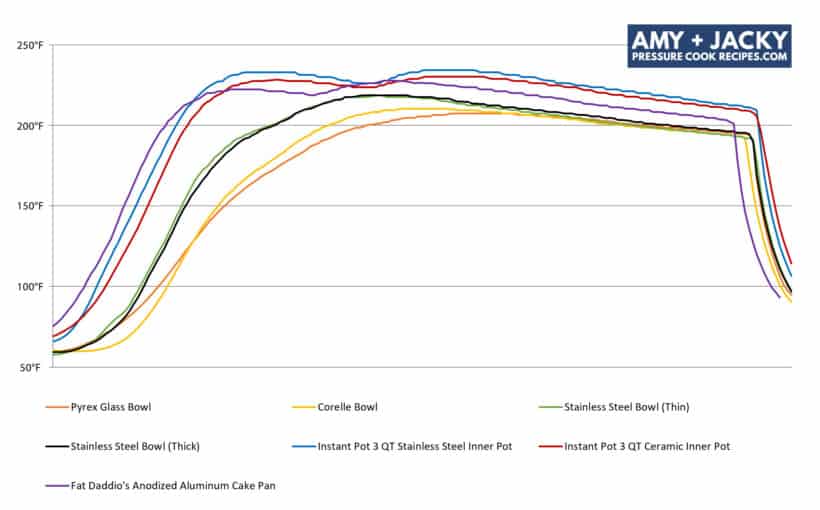
Containers’ Heat Transfer Rate Observations:
- Anodized aluminum and stainless steel containers have a much faster heat transfer rate than glass (especially thicker glass).
- As we have imagined, the pyrex glass bowl and Corelle bowl heat up a lot slower than the other containers.
Max Temperature Reached by the Containers in Instant Pot:
- 7-inch Pyrex Glass Container – 207.3°F (97.4°C)
- – 210.2°F (99°C)
- 7″ Stainless Steel Container (Thinner) – 218.7°F (103.7°C)
- 6.5″ Stainless Steel Container (Thicker) – 218.7°F (103.7°C)
- 3 QT Instant Pot Stainless Steel Inner Pot – 232.8°F (111.6°C)
- 3 QT Instant Pot Ceramic Inner Pot – 228.4°F (109.1°C)
- 6-inch Fat Daddio's Anodized Aluminum Cake Pan – 227.7°F (108.7°C)
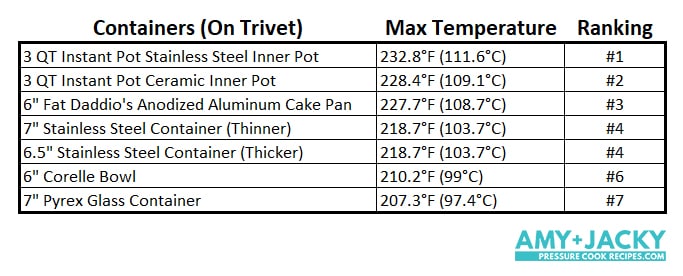
B. Pot in Pot Cooking Method without a Trivet
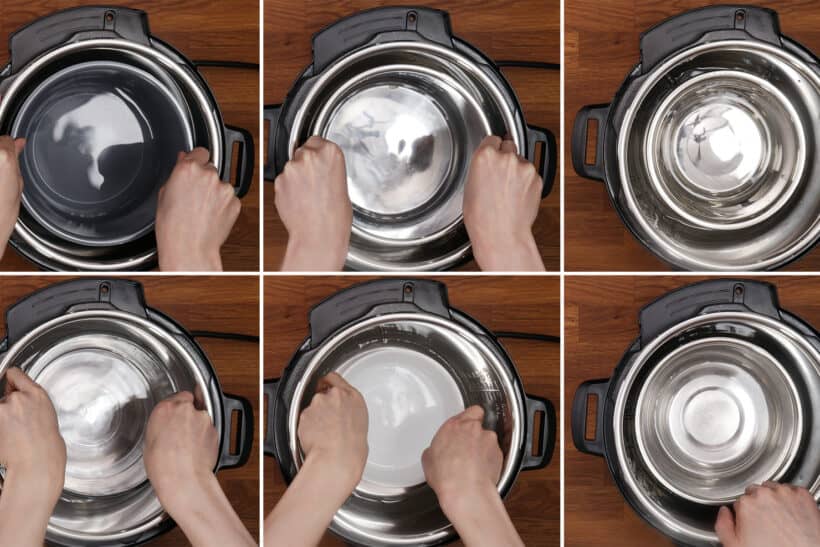
Testing Method: We added 1 cup (250ml) of cold water in Instant Pot. Add in the container and pour 1 cup (250ml) of cold water into the container. We repeated the same steps as Experiment A, but we put the container directly in the water with no trivet.
- Liquid: 1 cup (250ml) cold water in the inner pot and 1 cup (250ml) cold water in the container
- PIP Container Location: directly in the water at the bottom of the inner pot (no trivet)
- Pressure Cooking Method: High Pressure for 10 minutes, then Natural Release for 15 minutes
*Note: for consistency, we repeated the same procedure for every container.
Experiment Results
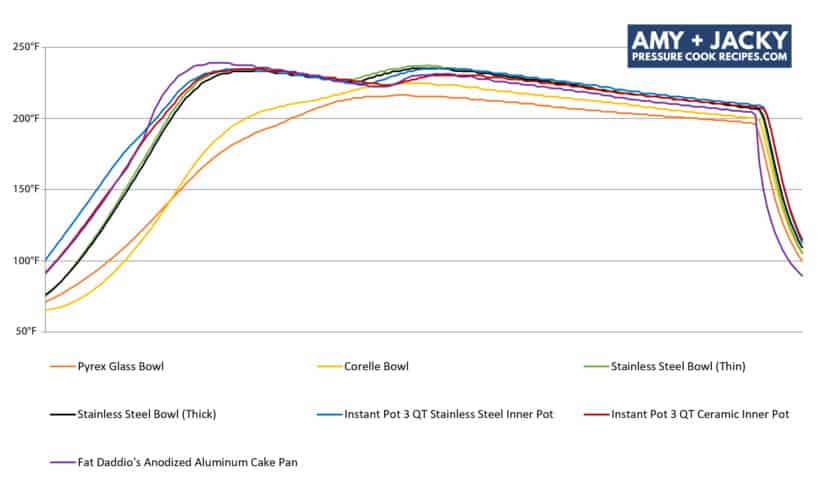
Stainless Steel vs Anodized Aluminum:
Looking at the chart, Anodized Aluminum seems to have a faster heat transfer rate than the other containers. It does reach a higher temperature faster. But the stainless steel containers are able to retain the heat better than the anodized aluminum pan.
Max Temperature Reached by the Containers in Instant Pot:
- 7-inch Pyrex Glass Container – 216.6°F (102.6°C)
- – 224.8°F (107.1°C)
- 7″ Stainless Steel Container (Thinner) – 237.4°F (114.1°C)
- 6.5″ Stainless Steel Container (Thicker) – 235.2°F (112.9°C)
- 3 QT Instant Pot Stainless Steel Inner Pot – 235.2°F (112.9°C)
- 3 QT Instant Pot Ceramic Inner Pot – 234.8°F (112.7°C)
- 6-inch Fat Daddio's Anodized Aluminum Cake Pan – 239°F (115°C)
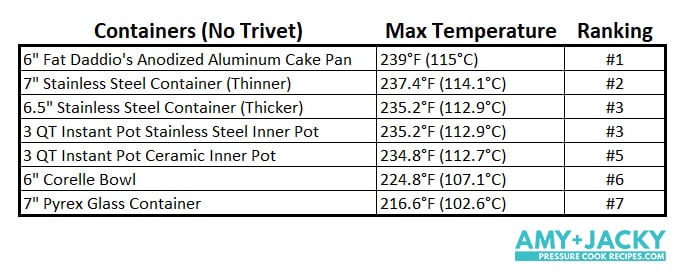
Our Pot in Pot Recommendations and Conclusion
Our Recommended Container Material (from Best to Worst):
- High-Quality Stainless Steel
- Anodized Aluminum & Lower-Quality Stainless Steel
- Oven-Safe Glass
1. Best Container – 3 Qt Instant Pot Stainless Steel Inner Pot
- Instant Pot stainless steel inner cooking pot, food grade 304 (18/8), no chemical coating
- Genuine Instant Pot pressure cooker accessory, dishwasher safe
3 QT Instant Pot Stainless Steel Inner Pot: The best container for Pot in Pot in the 6 Quart or 8 Quart Instant Pot.
- Overall, it has one of the fastest heat transfer rates.
- Due to its thickness, it has the best overall heat-retaining rate.
- Because of its taller height, it’ll prevent foamy food from spilling out of the container.
2. Runner Up Containers
6-inch Fat Daddio’s Anodized Aluminum Cake Pan: This is the best alternative to the 3 qt stainless steel pot. Since this cake pan doesn’t retain heat as well as the best performer, this is the second-best choice.
- Ideal for any recipe - Designed for small round tiered and layered cakes, and deep-dish...
- Perfect Fit - Fits 3, 6 & 8-quart pressure cookers and 3.4, 4, 5.3 & 10-quart air fryers....
3 QT Instant Pot Ceramic Inner Pot: The ceramic version of the 3 Quart Inner Pot performed surprisingly well. If you need a non-stick pot for rice or other sticky food, this is a very good choice.
- NON-STICK INTERIOR: Get to cooking with high quality non-stick coating! Safe for food...
- EASY TO CLEAN: You won't need to scrub so hard to get rid of stains. This ceramic cooking...
3. Least Preferred Containers – Oven-Safe Glass
Oven-safe glass is our last pot in pot container choice.
There are a few things to look out for when using Pyrex Glass Container or for the pot in pot method.
1. You must follow all the safety precautions from Pyrex. Such as avoid sudden temperature changes.
2. Make sure there are no fine scratches, chips, cracks on the oven-safe glass bowl. Because there’s a rare chance that they may break or shatter.
3. Don’t place the hot glass bowl on a wet or cool surface, nor handle it with a wet towel or potholder. Before washing, refrigerating, or freezing the hot glass bowl, allow it to cool on a cooling rack or dry surface.
4. Depending on what you cook, you may need to increase the cooking time by a few minutes due to the glass bowl’s slower heat transfer rate.
Have fun cooking with this Pot in Pot Cooking Method!
All Our Pressure Cooker Recipes
*Disclosure: We are an Amazon Influencer/Amazon Associate. This means that if you decide to purchase items or services on Amazon through our links on Pressure Cook Recipes to Amazon, Amazon will send a small commission to us at no additional costs to you. Thank you!
